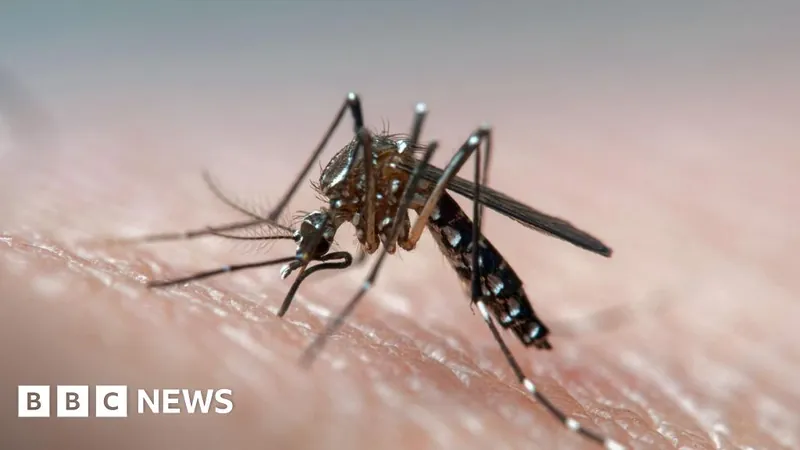
Groundbreaking Strategy to Combat Dengue: Researchers Render Male Mosquitoes Deaf!
2024-11-05
Author: Wei
Groundbreaking Strategy to Combat Dengue: Researchers Render Male Mosquitoes Deaf!
In a fascinating breakthrough, scientists have discovered an innovative approach to tackle dengue and other mosquito-borne diseases like yellow fever and Zika: making male mosquitoes deaf, literally throwing a wrench in their mating game!
Typically, male mosquitoes are highly reliant on their hearing to find and pursue females, using the pitch of her wingbeats as a guide. However, researchers from the University of California, Irvine, took a bold step by altering the genetic pathways associated with hearing in these pesky insects. The results were astounding; these genetically modified males couldn't mate even after spending three days in close proximity to unmated female mosquitoes.
This evolution in research is crucial, as only female mosquitoes transmit dangerous viruses to humans. By hindering their ability to breed, experts hope to significantly reduce the overall mosquito population—a move that could potentially save hundreds of millions from the devastating effects of these diseases. Aedes aegypti, the primary vector responsible for affecting approximately 400 million people every year, was the specific species under investigation. The research team meticulously examined the mating rituals of these mosquitoes, which can occur mid-air for durations varying from a few seconds to nearly a minute.
To disrupt their mating habits, scientists targeted a protein known as trpVa, essential for the insects’ auditory functions. The results were crystal clear: the modified mosquitoes showed no response to any sound stimuli associated with potential female mates. The classic courtship tunes played entirely to deaf ears, leaving the wild male mosquitoes to practically dominate the mating scene, successfully fertilizing nearly all available females in their habitat.
The groundbreaking findings, published in the journal PNAS, highlight the absolute effectiveness of this gene knock-out strategy. Dr. Joerg Albert, a recognized expert in mosquito mating from the University of Oldenburg in Germany, weighed in on the significance of this study. He emphasized that understanding the role of sound in reproduction holds promise for future mosquito control measures. "This research showcases a direct molecular test emphasizing that hearing isn't merely important for mosquito reproduction—it’s essential. Without the capacity to hear and locate females acoustically, we might see significant declines in certain mosquito populations."
In addition to this deafening strategy, researchers are also looking into releasing sterile males in areas heavily affected by mosquito-borne diseases, further diversifying control methods.
While mosquitoes are often vilified for their role in spreading dangerous diseases, it's worth remembering that they play a vital role in ecosystems. They serve as essential nourishment for various species, including fish, birds, bats, and frogs, and contribute to the pollination of several plants. As we venture further down this research rabbit hole, the hope is for a balanced solution that can help mitigate the risks posed by these insects while respecting their ecological contributions.

 Brasil (PT)
Brasil (PT)
 Canada (EN)
Canada (EN)
 Chile (ES)
Chile (ES)
 España (ES)
España (ES)
 France (FR)
France (FR)
 Hong Kong (EN)
Hong Kong (EN)
 Italia (IT)
Italia (IT)
 日本 (JA)
日本 (JA)
 Magyarország (HU)
Magyarország (HU)
 Norge (NO)
Norge (NO)
 Polska (PL)
Polska (PL)
 Schweiz (DE)
Schweiz (DE)
 Singapore (EN)
Singapore (EN)
 Sverige (SV)
Sverige (SV)
 Suomi (FI)
Suomi (FI)
 Türkiye (TR)
Türkiye (TR)